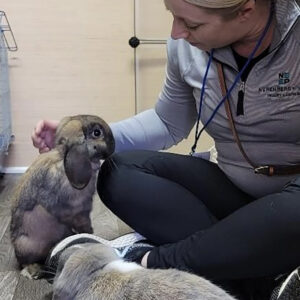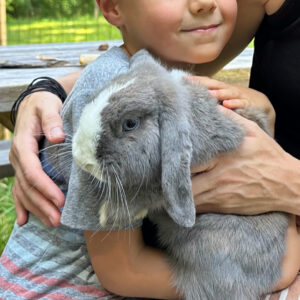Bunny Village
 Small Friends Providing Big Support
Small Friends Providing Big Support
The Bunny Village is an animal-assisted facility designed to support individuals at The Farm at Penny Lane. We provide a space for participating groups at The Farm such as wellness, art and creative writing, and yoga groups to be held alongside the company of bunnies. The bunnies may also be used as an Animal-Assisted Intervention aid for client therapy sessions. The Bunny Village is also an occupational practice for individuals at The Farm at Penny Lane. Individuals learn to care for and nurture the rabbits as an outlet for learning responsibility and self-care for themselves.
Our Mission
At the Bunny Village, we provide a space where rabbits are available as an aid in client therapy sessions as emotional support for those involved with The Farm at Penny Lane. But what makes The Bunny Village unique is that it will also be a space founded on self-discovery and learning, with lessons taught by the animals themselves. We hypothesize that the continuous care and reflection given through engagement with these animals will create exponential growth in individuals’ understanding of and commitment to their healing and wellbeing.




Past Research
Little research has been done on the benefits of rabbits as an Animal-Assisted Intervention (AAI) support for adults, however recent studies have found that rabbits used as an AAI in youth classrooms significantly reduced anxiety in children with especially high anxiety symptoms (Molnár et al., 2019).
We believe these findings could easily translate to adult individuals. Many people who experience severe anxiety and/or PTSD experience hypersensitivity to loud noises and fast movement through development of misophonia and/or hyperacusis (Siepsiak et al., 2020). This can make the process of engaging with some AAI animals like a dog or horse more difficult. Noticing this barrier, rabbits could become a great alternative AAI aid. Another qualitative study examining the use of rabbits as an AAI in a Midwestern Residential facility found that rabbits served as a significant source of social support and encouraged social interaction between the residents and family members (Pitheckoff et al, 2018). An exploratory study examined the use of rabbits as an AAI in different practices and found that many therapists have used rabbits in their practices for client emotional support and as a therapy aid for processing interpersonal relationship development and examining client trauma (Crawford, 2018).
Why Bunnies?
Rabbits provide a unique form of AAI support, they provide emotional regulation and comfort but they also have the ability to deepen our understanding of ourselves and our relationships with others. Rabbits are quiet and small prey animals. It takes time to build the trust of a rabbit, allowing individuals to reflect upon the process of building interpersonal connection through thoughtful patience. We are able to reflect on our own emotional barriers and notice our own limitations, just like the rabbit. Rabbits are also very dependent on us, they need us just as much as we need them. This provides a wonderful opportunity for an occupational practice founded in Occupational Therapy. We encourage rehabilitation through the performance of activities required in daily life, such as learning to take care of another living being, so we can learn how to take care of ourselves.
Sources
Pitheckoff, N., McLaughlin, S. J., & de Medeiros, K. (2018). “Calm . . . Satisfied . . . Comforting”: The Experience and Meaning of Rabbit-Assisted Activities for Older Adults. Journal of applied gerontology : the official journal of the Southern Gerontological Society, 37(12), 1564–1575. https://doi.org/10.1177/0733464816680322
Molnár, M., Iváncsik, R., DiBlasio, B., & Nagy, I. (2019). Examining the Effects of Rabbit-Assisted Interventions in the Classroom Environment. Animals : an open access journal from MDPI, 10(1), 26. https://doi.org/10.3390/ani10010026
Crawford, M. E. (2018). An exploratory study on the characteristics of rabbits used for animal-assisted therapy (Order No. 10813263). Available from ProQuest Dissertations & Theses Global. (2077254770). Retrieved from http://libproxy.lib.unc.edu/login?url=https://www.proquest.com/dissertations-theses/exploratorystudy-
on-characteristics-rabbits-used/docview/2077254770/se-2
Siepsiak, M., Sobczak, A. M., Bohaterewicz, B., Cichocki, Ł., & Dragan, W. Ł. (2020). Prevalence of Misophonia and Correlates of Its Symptoms among Inpatients with Depression. International journal of environmental research and public health, 17(15), 5464. https://doi.org/10.3390/ijerph17155464
Support Mental Health Recovery
Your donations support the creative alternative recovery programs. These programs include group therapies such as Horticultural Therapy, Brushes with Life, and Wellness Wednesday. As well as community programs such as the CORA Food Pantry, Wellness on Wheels Mobile Clinic and Tiny Home Village.
